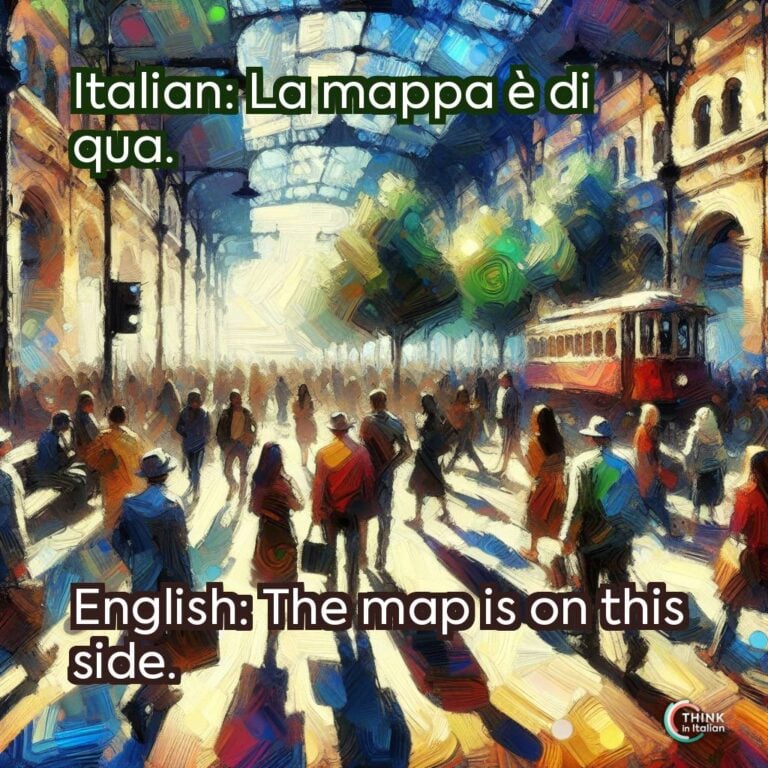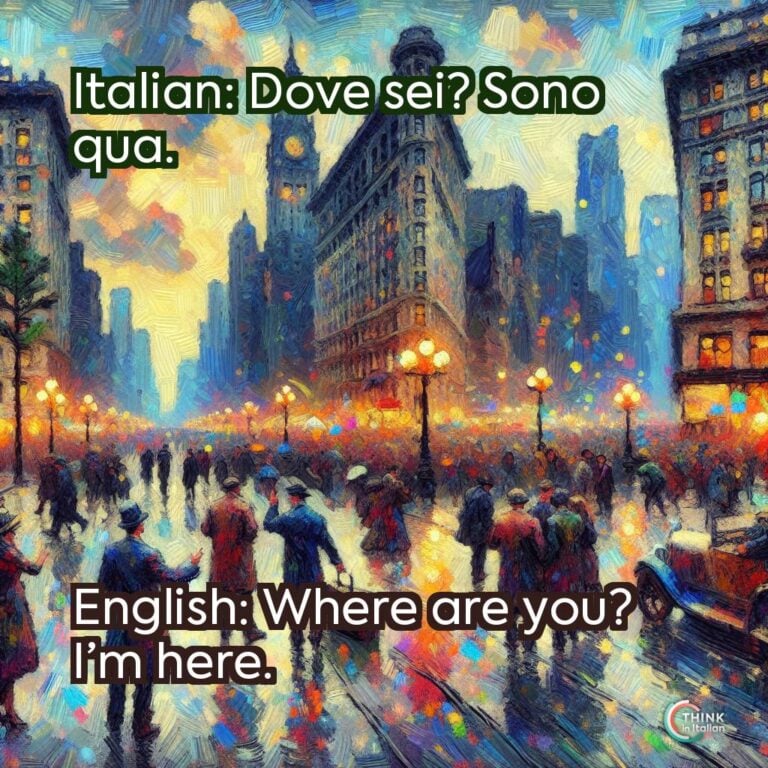“qui” vs “qua” in ITalian
In Italian, there are subtle differences between “qui” and “qua“. Let’s look into their meanings and use.
| Qui | Qua | |
|---|---|---|
| Meaning | Here | There |
| Usage | Refers to something close to the speaker. | Refers to something close to the listener. |
To understand the difference between these two words, it’s important to remember that “qui” usually relates to a particular place or person near the speaker, while “qua” denotes a general area or individual closer to the listener. Knowing this can help when using these words in conversation.
I recently had an experience that showed the distinction. At an Italian restaurant, I noticed a friend across the room. So, I gestured and said “Qui” to point out his nearness. Later on, my friend talked about an acquaintance at a nearby table. He simply pointed in that direction, saying “Qua“. This proves that using “qui” and “qua” correctly can make communication in Italian much easier.
Struggling to comprehend “qui“, “qua“, and “di qua“? Don’t worry, even Shakespeare would need help with these!
Qui, qua, and di qua explained
In Italian, ‘qui’, ‘qua’, and ‘di qua’ are distinct words for various degrees of location. In Italian grammar, “qui” and “qua” are adverbs that indicate location or position, specifically related to the concepts of “here” or “this place.” They are used to specify or describe where something is located, and they convey a sense of proximity.
Here’s a breakdown of their grammatical roles.
‘Qui‘ means near the speaker.
‘Qua‘ is closer than ‘qui’.
‘Di qua‘ suggests movement from one place to another nearby.
Qui, qua, di qua in Italian conversation
In Italy, ‘qui‘, ‘qua‘, and ‘di qua‘ are often used in conversation. Here’s a look at their meanings and usage:
| Word | Meaning | Usage |
|---|---|---|
| Qui | Here | Refers to a spot near the speaker |
| Qua | This way | Refers to a spot near the listener |
| Di qua | On this side | Refers to movement towards the speaker |
“Qui” (Here):
Italian: “Ho lasciato le chiavi qui.”
English: “I left the keys here.”
“Qua” (This way):
Italian: “Vieni qua, ti mostro qualcosa.”
English: “Come this way; I’ll show you something.”
“Di qua” (On this side):
Italian: “Attraversa la strada di qua.”
English: “Cross the street on this side.”
These examples demonstrate how these Italian words are used in various situations to refer to specific locations and directions in conversation.Furthermore, these words can have metaphorical uses, such as to express proximity or accessibility. It all depends on the context.
Learn more about Italian adverbs of place.
Italian language qui vs qua
Italian contains “qui” and “qua“, which both mean “here” in English. But they have different uses. Let’s compare them in a table:
| Qui | Qua |
|---|---|
| Closer to speaker | Away from speaker |
| Specific | General |
| Stationary | Mobile |
In some cases, you can use “qui” and “qua” interchangeably. But they have different meanings.
Using “Qui” (Here):
Italian: La mia casa è qui.
English: My house is here.
Italian: Posso vederti qui?
English: Can I see you here?
Italian: Resta qui con me.
English: Stay here with me.
Using “Qua” (Here):
Italian: La festa è qua.
English: The party is here.
Italian: Portami quella pianta qua.
English: Bring me that plant here.
Italian: Per favore, mettilo qua.
English: Please, put it here.
Interchangeable Use:
Italian: Il negozio è qui/qua.
English: The store is here.
Italian: Metti il libro qui/qua.
English: Put the book here.
In some situations, “qui” and “qua” can be used interchangeably to indicate a location, but they have distinct connotations based on their use in specific contexts. “Qui” is typically used for a specific, stationary location, while “qua” can have a more general or mobile sense, suggesting movement or a broader area.
Want to learn how to make Italian sentences naturally? Try Italian audio course that helps students learn Italian by learning just 20 minutes a day.




